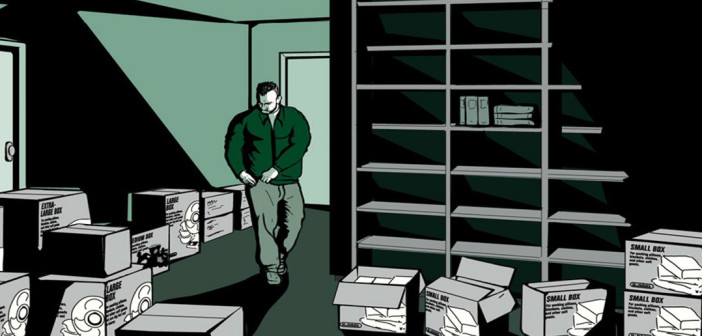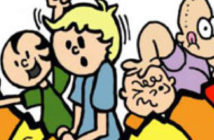Steve MacIsaac is a superior storyteller of the human condition, and his independent series, Shirtlifter, operates as his ongoing magnum opus. MacIsaac, a gay man residing in Long Beach, California, certainly is not shy about sex—at least in his comics, anyway. His books boil with homosexual eroticism, and upon initial consideration, they’re easily labeled pornography because of the explicit content’s depth and breadth. But don’t be mistaken: they’re not just purely pornographic. They’re simply honest.
MacIsaac has both written and illustrated three books in his Shirtlifter series, and each one categorizes both a social and sexual segment of the gay community. Don’t worry: MacIsaac never once plays the role of a proselytizing, armchair sociologist whose singular mission is bringing everyone out of the closet. He’s simply telling stories from his perspective; some are autobiographical while others are fictional, but he writes in the afterward of issue two the following: “Even when writing pure fiction, elements of my life tend to surface.”
I gather from these stories that MacIsaac views his life as somewhat mundane—but the voyeuristic insights I’ve gained from his books lead me to believe the opposite. No, I don’t refer to the rampant sexual encounters, though they do happen. Rather, I am left to reflect on the previously mentioned note from his afterward: are these tales true to life, or are they fabricated? As MacIsaac hints at—we’re given a smidge of both, it seems.
The first issue of Shirtlifter debuted in 2006, but MacIsaac has since re-released the comic in the summer of 2010; it’s a renewed version, both artistically and narratively. The issue, titled “Unmade Beds,” tells the story of an American gay couple living in Japan. Michael, the breadwinner of the pair, was transferred there by his company, and his boyfriend, Derek, tagged along for the adventure. Though, at the opening of the story, he’s since grown weary of the continental transition and wishes to return to his home of Los Angeles once Michael’s contract is up.
Derek himself works as an ESL instructor, but his hours are not as consistent as Michael’s, providing him with a little too much playtime. I say “playtime” because Derek plays with several partners outside of his relationship, and writer MacIsaac slyly avoids providing commentary on whether or not he’s explicitly cheating. It’s no secret that some gay couples openly swing with additional partners, though whenever Derek indulges himself, it comes across as petty and deceptive.
With all of Derek’s talk about returning to L.A., it’s no surprise when we learn that Michael’s contract has been extended. Enraged, Derek does what he does best: he beds a stranger. When he returns home, he finds a gesture of love from Michael. I won’t say what it is, but it leads up to four poignant cinemascope panels that bring the issue to a close. We see both Derek and Michael’s faces, though they can’t see one another, and while no words are spoken, their eyes tells us all we need to know about the core of their relationship.
While “Unmade Beds” is traditionally linear in its storytelling, the second issue is a collection of short stories, some of which are explicitly autobiographical. When I say explicit, I mean that MacIsaac doesn’t hide the fact that he’s talking about himself and experiences pulled directly from his own life.
While all of the stories are intimately communicated and handsomely illustrated, two are worth a special mention: “Waiting for the Bus” and “Safe.”
These two narratives stand out because they’re definitive proof that MacIsaac is working on a superior plane as a storyteller. He nimbly interweaves several threads of metaphorical dialogue throughout his precise imagery, achieving a quality of storytelling that is only possible in the comics medium. Of the two, “Safe” left me with an unshakeable chill. It’s a story about a young man’s infection with HIV, and while it’s sexually explicit, there’s nothing erotic about it. It’s symbolically a ghost story with a haunting message from the 1980s when the gay community was first plagued by the dread virus, and serves as a reminder that HIV/AIDS is still the deadly scarlet letter branded upon the gay community. (Note: MacIsaac mentions in the afterward of issue two that “Safe” is not about him personally.)
Meanwhile, the third issue of Shirtlifter returns to the long-form, linear storytelling of the first. Titled “Unpacking,” the comic chronicles the life of Matt, an ad designer living in Vancouver. He’s out of a recent relationship and has since been on the prowl looking for other men. A physical (and possibly emotional) void is filled when he meets a traveling businessman, even though he’s married and has two children.
My description is pathetically melodramatic. “Unpacking,” like all of the other stories in the Shirtlifter series, is an organic examination of one gay man trying to live his life. There’s a fair amount of clear, unambiguous sex, but there is never sex for sex’s sake. There’s crucial conversation before and after—genuine discourse that calls the decisions of Matt and his married lover into question.
MacIsaac’s work as a cartoonist is exquisitely consistent. His style is reminiscent of an X-rated Charles Burns: he structures his burly characters with an illustrated humanity that makes them nearly tangible. And how the different players in his books incline their heads and position their bodies is uncannily lifelike. This is made possible because of the strict control MacIsaac holds over every single page. Most of his panels are traditionally angular, but others utilize the page through ingenious methods, such as a scene in “Unpacking” where Matt is talking to a friend on the telephone. Matt’s panels are isolated on the upper half of the page, while his friend’s are on the bottom. Their word balloons meet in the middle. And while Shirtlifter isn’t black and white in its current incarnation, most of the stories are not fully colored, either. Instead, MacIsaac uses shades and tones to add a special touch of emotional resonance to his books.
I can’t help but return to the label of pornography in regards to Shirtlifter. I remember when Alan Moore and Melinda Gebbie’s Lost Girls was first released. Several readers and critics wanted to call the book “erotica.” Moore and Gebbie protested tirelessly—in their eyes, it was pornography. Here in the West, we insist that porn is entertainment depicting sex for the sake of sex and nothing more. But when something like Lost Girls or Shirtlifter enters the paradigm, what exactly do we call it? Is there something wrong with explicitly displaying sex in the context of a story that tackles a variety of other worldly issues?
I certainly don’t think so. Consider French filmmaker Catherine Breillat in this regard. And in our political and socio-cultural climate, what with gay teens throwing themselves from bridges and the United States Military openly practicing discrimination against the LGBT community, aren’t we in need of some bold honesty? Because of this, Shirtlifter stands as one of the finest slice-of-life stories I’ve read in years, ranking with ease in the company of Craig Thompson’s Blankets, Alison Bechdel’s Fun Home, and Adrian Tomine’s Shortcomings.
Yes, it’s pornographic, but it’s also genuinely human and without pretension. There’s no arrogant moralizing or braying solipsism. Whether the stories contained within the issues of Shirtlifter are factual or fictional, or the mixture of both they’re said to be, they’re all instructive of MacIsaac’s unadulterated reality, and who better to teach us than MacIsaac himself?
This comic book review originally appeared on Broken Frontier.




